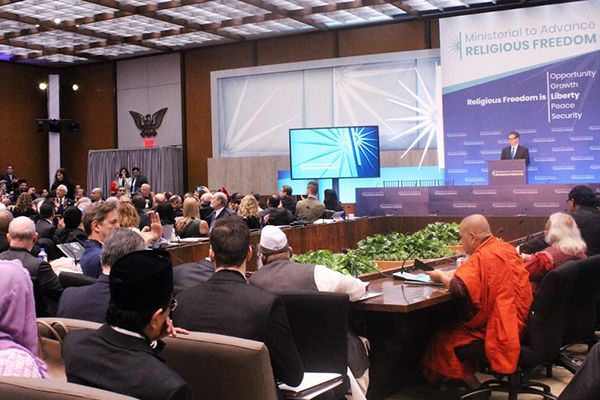Religious leaders, government officials, rights advocates and members of civil society organizations from around the world gathered in Washington on July 24–26 for the United States’ first-ever conference on religious freedom.
U.S. Secretary of State Mike Pompeo hosted the Ministerial to Advance Religious Freedom at the State Department.
Organizers said the goal of the conference was to develop “concrete ways” to reduce religious persecution across the globe.
“My own faith is of the greatest importance to me personally,” said Pompeo on the closing day of the conference. “As an American, I’ve been blessed with the right to live out what I believe without fear of persecution or reprisal from my government. I want everyone else to enjoy this blessing too.”
U.S. Ambassador-at-Large for International Religious Freedom Sam Brownback opened the summit July 24 by urging leaders to work together to help the persecuted across the globe.
“We need your faith in action to move the world to not just tolerance of differences — although that’s important — but unfortunately, that bar is just too low,” Brownback said. “We must move to a place where people genuinely care and love one another, no matter our differences. You must help us get there.”
Brownback said the faiths represented among the 350 attendees from 80 countries included Muslims, Jews, Christians, Buddhists, Hindus, Sikhs, Baha’is, Yazidis and others.
Experts say roughly three-fourths of the world’s population faces some restriction on religious freedom.
One of the biggest offenders is North Korea. Pompeo traveled there in early July for meetings on denuclearization, but North Korea’s human rights record is a major concern as well.
Turkey got attention on the final day of the conference after news came that Andrew Brunson, an evangelical Christian pastor originally from North Carolina, was let out of jail there July 25 after 18 months in prison to serve house arrest because of “health problems,” according to Turkey’s official Anadolu news agency.
Brunson faces charges of terrorism and espionage, charges he denies. If convicted, Brunson faces upwards of 15 years in prison.
Speaking at the conference, Vice President Mike Pence called on Turkey, who sent no representatives to the conference, to release Brunson or face consequences.
“If Turkey does not take immediate action to free this innocent man of faith and send him home to America, the United States will impose significant sanctions on Turkey until Pastor Andrew Brunson is free,” Pence said.
Pence also cited the Nicaraguan government of President Daniel Ortega “virtually waging war on the Catholic Church,” the torture of Tibetan Buddhists in China, forced abortions and the outlawing of the Christian Bible in North Korea and Russia’s imprisonment of Jehovah’s Witnesses.
Pence, along with Secretary of State Mike Pompeo, listed several new initiatives to continue the goals of the summit, which will become an annual event.
Pence said the U.S. is launching a Genocide Recovery and Persecution Response Program, under which the State Department and the U.S. Agency for International Development will help victims of persecution.
“America will help the victims of ISIS reclaim their lands, rebuild their lives and replant their roots in their ancient homelands, so that all religions can flourish once again across the Middle East and the ancient world,” he said.
Pompeo also addressed the rebuilding of religious communities in Iraq that have been devastated by the so-called Islamic State, also known as ISIS.
Pompeo announced other events including a leadership program for those on the “frontlines of religious freedom issues”; a workshop, planned for October, to support private/public partnerships defending religious freedom; and regional conferences to the summit in several countries.
Pence also announced a new International Religious Freedom Fund to assist persecuted religious minorities and asked other nations to join the United States in supporting it.
Both Pence and Pompeo reflected on their own faith as they repeatedly pledged the administration would be committed to the rights of people of all faiths.
He added: “The United States advances religious freedom in our foreign policy because it is not exclusively an American right. It is a God-given universal right bestowed on all of mankind.” (Compiled from RNS reports)






Share with others: